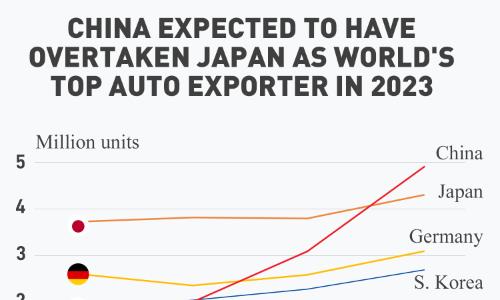
Illustration: Chen Xia/Global Times
The reported visit to China by a delegation of senior Japanese business leaders, led by Shindo Kosei, head of the Japan-China Economic Association, comes in time to strengthen communication and coordination in order to stabilize bilateral economic relations. According to Japanese media outlets, this is Japanese business leaders' first visit to China in approximately four years.Given the complex geopolitical situation where the "decoupling from China" theory continues to cloud regional supply chains, especially regarding cooperation in high-tech industries like semiconductors and electric vehicle batteries, enhanced communication itself is a positive sign for bilateral cooperation.
As a restructuring of the Asian industry chain seems to have accelerated amid global economic uncertainty, some challenges constrain the development of bilateral trade and investment. China's overall exports to Japan dropped 8.4 percent year-on-year in 2023 while imports from Japan declined 12.9 percent.
The Japanese Chamber of Commerce and Industry in China recently published figures showing 48 percent of Japanese companies surveyed in China said that they had reduced their investment in China in 2023 compared to the previous year, or had not invested any further.
It is necessary to analyze the potential problems facing bilateral economic cooperation and maintain high-level exchanges, dialogue and communication between China and Japan. Hopefully, the delegation led by Shindo Kosei could help stabilize bilateral economic relations.
China and Japan have recently encountered some setbacks in their economic relationship, and the Japanese side should be held responsible. For instance, it is reasonable for China to suspend imports of aquatic products originating from Japan to prevent risks from Japan's dumping of nuclear-contaminated wastewater. Some Japanese people may want to turn China's ban on aquatic product imports into an issue of geopolitics and pressure China to resume imports, but it's impossible to solve problems by politicizing economic issues.
In another example, Japanese restrictions on exports of advanced chipmaking equipment reportedly took effect in July, 2023, in line with US-led efforts to stymie China's ability to develop high-end semiconductors. Clearly, this has a negative impact on Japan's exports to China. Japan should shoulder more responsibility in stabilizing trade, investment and economic cooperation with China.
Chinese officials have repeatedly stressed that China will always welcome foreign companies, including Japanese firms, to invest and operate in China. However, it seems that some Japanese companies are still skeptical about China's sincerity in attracting foreign investment. China's revised counter-espionage law took effect in July to safeguard national security, but some media reports raised unnecessary concerns about "arbitrary enforcement."
In the face of domestic and external uncertainties, it is normal that China's plan to make itself a better investment destination is unlikely to be realized as smoothly as we imagined. Japan and China should make a concerted effort to manage bilateral economic relations with great care, strengthen communication and eliminate misunderstandings.
Economic complementarity between China and Japan is likely to be enhanced as China steps up efforts in technological innovation and moves up the value chain. With China's technological advancement, there is great potential for China-Japan economic cooperation in high-end manufacturing industries such as semiconductors and electric vehicle batteries. Hopefully, such cooperation won't be affected by geopolitical issues and unnecessary concerns about China's counter-espionage law.
Undoubtedly, efforts to stabilize China-Japan economic relations are in line with the interests of Japanese enterprises. The report by the Japanese Chamber of Commerce and Industry in China showed that about half of the companies surveyed still thought China was the most important market globally or among the top three most important in 2024.
China is Japan's largest trading partner, and one of the biggest investment destinations for Japanese companies. China and Japan could complement one another in economic modernization despite their differences. Hopefully, the Japanese business delegation led by Shindo Kosei could give a boost to economic cooperation.
The author is a reporter with the Global Times. bizopinion@globaltimes.com.cn



